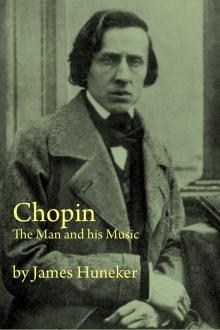Chopin: The Man and His Music by James Huneker (cat reading book txt) 📕

- Author: James Huneker
- Performer: -
Book online «Chopin: The Man and His Music by James Huneker (cat reading book txt) 📕». Author James Huneker
Project Gutenberg’s Chopin: The Man and His Music, by James Huneker This eBook is for the use of anyone anywhere at no cost and with almost no restrictions whatsoever. You may copy it, give it away or re-use it under the terms of the Project Gutenberg License included with this eBook or online at www.gutenberg.net Title: Chopin: The Man and His Music
Author: James Huneker
Posting Date: June 14, 2010 [EBook #4939]
Release Date: January, 2004
First Posted: April 1, 2002
Language: English
Character set encoding: ASCII
*** START OF THIS PROJECT GUTENBERG EBOOK CHOPIN: THE MAN AND HIS MUSIC ***
Produced by John Mamoun <mamounjo@umdnj.edu> with help from Charles Franks and the Online Distributed Proofreaders website.
CHOPIN: THE MAN AND HIS MUSIC
by
James Huneker
TABLE OF CONTENTSPART I.—THE MAN.
I. POLAND:—YOUTHFUL IDEALS
II. PARIS:—IN THE MAELSTROM
III. ENGLAND, SCOTLAND AND FERE LA CHAISE
IV. THE ARTIST
V. POET AND PSYCHOLOGIST
PART II.—HIS MUSIC.
VI. THE STUDIES:—TITANIC EXPERIMENTS
VII. MOODS IN MINIATURE: THE PRELUDES
VIII. IMPROMPTUS AND VALSES
IX. NIGHT AND ITS MELANCHOLY MYSTERIES: THE NOCTURNES
X. THE BALLADES: FAERY DRAMAS
XI. CLASSICAL CURRENTS
XII. THE POLONAISES: HEROIC HYMNS OF BATTLE
XIII. MAZURKAS: DANCES OF THE SOUL
XIV. CHOPIN THE CONQUEROR
BIBLIOGRAPHY BOOKS BY JAMES HUNEKERPART I.—THE MAN
I. POLAND:—YOUTHFUL IDEALS
Gustave Flaubert, pessimist and master of cadenced lyric prose, urged young writers to lead ascetic lives that in their art they might be violent. Chopin’s violence was psychic, a travailing and groaning of the spirit; the bright roughness of adventure was missing from his quotidian existence. The tragedy was within. One recalls Maurice Maeterlinck: “Whereas most of our life is passed far from blood, cries and swords, and the tears of men have become silent, invisible and almost spiritual.” Chopin went from Poland to France—from Warsaw to Paris—where, finally, he was borne to his grave in Pere la Chaise. He lived, loved and died; and not for him were the perils, prizes and fascinations of a hero’s career. He fought his battles within the walls of his soul—we may note and enjoy them in his music. His outward state was not niggardly of incident though his inner life was richer, nourished as it was in the silence and the profound unrest of a being that irritably resented every intrusion. There were events that left ineradicable impressions upon his nature, upon his work: his early love, his sorrow at parting from parents and home, the shock of the Warsaw revolt, his passion for George Sand, the death of his father and of his friend Matuszynski, and the rupture with Madame Sand—these were crises of his history. All else was but an indeterminate factor in the scheme of his earthly sojourn. Chopin though not an anchorite resembled Flaubert, being both proud and timid; he led a detached life, hence his art was bold and violent. Unlike Liszt he seldom sought the glamor of the theatre, and was never in such public view as his maternal admirer, Sand. He was Frederic Francois Chopin, composer, teacher of piano and a lyric genius of the highest range.
Recently the date of his birth has been again discussed by Natalie Janotha, the Polish pianist. Chopin was born in Zelazowa-Wola, six miles from Warsaw, March 1, 1809. This place is sometimes spelled Jeliasovaya-Volia. The medallion made for the tomb by Clesinger—the son-in-law of George Sand—and the watch given by the singer Catalan!
in 1820 with the inscription “Donne par Madame Catalan! a Frederic Chopin, age de dix ans,” have incited a conflict of authorities.
Karasowski was informed by Chopin’s sister that the correct year of his birth was 1809, and Szulc, Sowinski and Niecks agree with him. Szulc asserts that the memorial in the Holy Cross Church, Warsaw—where Chopin’s heart is preserved—bears the date March 2, 1809. Chopin, so Henry T. Finck declares, was twenty-two years of age when he wrote to his teacher Elsner in 1831. Liszt told Niecks in 1878 that Karasowski had published the correct date in his biography. Now let us consider Janotha’s arguments. According to her evidence the composer’s natal day was February 22, 1810 and his christening occurred April 28 of the same year. The following baptismal certificate, originally in Latin and translated by Finck, is adduced. It is said to be from the church in which Chopin was christened: “I, the above, have performed the ceremony of baptizing in water a boy with the double name Frederic Francois, on the 22d day of February, son of the musicians Nicolai Choppen, a Frenchman, and Justina de Krzyzanowska his legal spouse. God-parents: the musicians Franciscus Grembeki and Donna Anna Skarbekowa, Countess of Zelazowa-Wola.” The wrong date was chiselled upon the monument unveiled October 14, 1894, at Chopin’s birthplace—erected practically through the efforts of Milia Balakireff the Russian composer. Janotha, whose father founded the Warsaw Conservatory, informed Finck that the later date has also been put on other monuments in Poland.
Now Chopin’s father was not a musician, neither was his mother. I cannot trace Grembeki, but we know that the Countess Skarbek, mother of Chopin’s namesake, was not a musician; however, the title “musician” in the baptismal certificate may have signified something eulogistic at that time. Besides, the Polish clergy was not a particularly accurate class. But Janotha has more testimony: in her controversy with me in 1896 she quoted Father Bielawski, the present cure of Brochow parish church of Zelazowa-Wola; this reverend person consulted records and gave as his opinion that 1810 is authentic. Nevertheless, the biography of Wojcicki and the statement of the Chopin family contradict him. And so the case stands. Janotha continues firm in her belief although authorities do not justify her position.
All this petty pother arose since Niecks’ comprehensive biography appeared. So sure was he of his facts that he disposed of the pseudo-date in one footnote. Perhaps the composer was to blame; artists, male as well as female, have been known to make themselves younger in years by conveniently forgetting their birthdate, or by attributing the error to carelessness in the registry of dates. Surely the Chopin family could not have been mistaken in such an important matter! Regarding Chopin’s ancestry there is still a moiety of doubt.
His father was born August 17, 1770—the same year as Beethoven—at Nancy, Lorraine. Some claim that he had Polish blood in his veins.
Szulc claims that he was the natural son of a Polish nobleman, who followed King Stanislas Leszcinski to Lorraine, dropping the Szopen, or Szop, for the more Gallic Chopin. When Frederic went to Paris, he in turn changed the name from Szopen to Chopin, which is common in France.
Chopin’s father emigrated to Warsaw in 1787—enticed by the offer of a compatriot there in the tobacco business—and was the traditional Frenchman of his time, well-bred, agreeable and more than usually cultivated.
He joined the national guard during the Kosciuszko revolution in 1794.
When business stagnated he was forced to teach in the family of the Leszynskis; Mary of that name, one of his pupils, being beloved by Napoleon I. became the mother of Count Walewski, a minister of the second French empire. Drifting to Zelazowa-Wola, Nicholas Chopin lived in the house of the Countess Skarbek, acting as tutor to her son, Frederic. There he made the acquaintance of Justina Krzyzanowska, born of “poor but noble parents.” He married her in 1806 and she bore him four children: three girls, and the boy Frederic Francois.
With a refined, scholarly French father, Polish in political sentiments, and an admirable Polish mother, patriotic to the extreme, Frederic grew to be an intelligent, vivacious, home-loving lad. Never a hearty boy but never very delicate, he seemed to escape most of the disagreeable ills of childhood. The moonstruck, pale, sentimental calf of many biographers, he never was. Strong evidence exists that he was merry, pleasure-loving and fond of practical jokes. While his father was never rich, the family after the removal to Warsaw lived at ease.
The country was prosperous and Chopin the elder became a professor in the Warsaw Lyceum. His children were brought up in an atmosphere of charming simplicity, love and refinement. The mother was an ideal mother, and, as George Sand declared, Chopin’s “only love.” But, as we shall discover later, Lelia was ever jealous—jealous even of Chopin’s past. His sisters were gifted, gentle and disposed to pet him. Niecks has killed all the pretty fairy tales of his poverty and suffering.
Strong common sense ruled the actions of Chopin’s parents, and when his love for music revealed itself at an early age they engaged a teacher named Adalbert Zwyny, a Bohemian who played the violin and taught piano. Julius Fontana, one of the first friends of the boy—he committed suicide in Paris, December 31, 1869,—says that at the age of twelve Chopin knew so much that he was left to himself with the usual good and ill results. He first played on February 24, 1818, a concerto by Gyrowetz and was so pleased with his new collar that he naively told his mother, “Everybody was looking at my collar.” His musical precocity, not as marked as Mozart’s, but phenomenal withal, brought him into intimacy with the Polish aristocracy and there his taste for fashionable society developed. The Czartoryskis, Radziwills, Skarbeks, Potockis, Lubeckis and the Grand Duke Constantine with his Princess Lowicka made life pleasant for the talented boy. Then came his lessons with Joseph Elsner in composition, lessons of great value. Elsner saw the material he had to mould, and so deftly did he teach that his pupil’s individuality was never checked, never warped. For Elsner Chopin entertained love and reverence; to him he wrote from Paris asking his advice in the matter of studying with Kalkbrenner, and this advice he took seriously. “From Zwyny and Elsner even the greatest ass must learn something,” he is quoted as having said.
Then there are the usual anecdotes—one is tempted to call them the stock stories of the boyhood of any great composer. In infancy Chopin could not hear music without crying. Mozart was morbidly sensitive to the tones of a trumpet. Later the Polish lad sported familiarly with his talents, for he is related to have sent to sleep and awakened a party of unruly boys at his father’s school. Another story is his fooling of a Jew merchant. He had high spirits, perhaps too high, for his slender physique. He was a facile mimic, and Liszt, Balzac, Bocage, Sand and others believed that he would have made an actor of ability.
With his sister Emilia he wrote a little comedy. Altogether he was a clever, if not a brilliant lad. His letters show that he was not the latter, for while they are lively they do not reveal much literary ability. But their writer saw with open eyes, eyes that were disposed to caricature the peculiarities of others. This trait, much clarified and spiritualized in later life, became a distinct, ironic note in his character. Possibly it attracted Heine, although his irony was on a more intellectual plane.
His piano playing at this time was neat and finished, and he had already begun those experimentings in technique and tone that afterward revolutionized the world of music and the keyboard. He being sickly and his sister’s health poor, the pair was sent in 1826 to Reinerz, a watering place in Prussian Silesia. This





Comments (0)